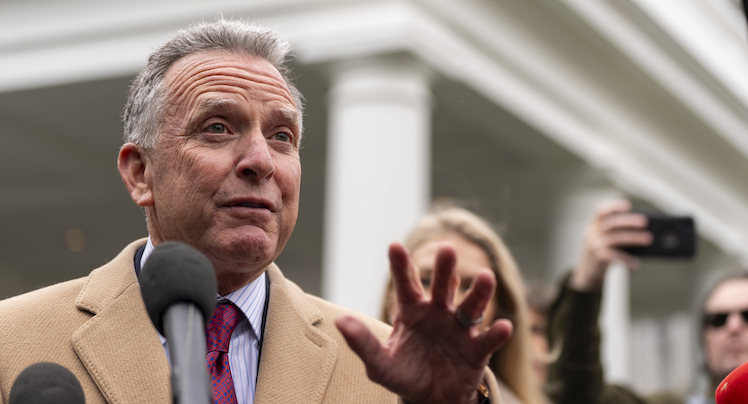Israelis may be relieved that U.S. envoy Adam Boehler has been sidelined from Hamas talks after his disastrous foray into hostage diplomacy, but they should remember that it is ultimately President Trump who sets the agenda. A new profile of the president’s main negotiator, Steve Witkoff, contains some insight into what Trump likes about Witkoff, what he expects of him, and what that means for anyone sitting across the table from him.
The Telegraph reports that Witkoff’s initial success in getting a cease-fire deal between Israel and Hamas raised his stature enough to earn a shot at ending Russia’s war in Ukraine. He has replaced Keith Kellogg, the retired general and national security adviser, as the administration’s top mediator for that conflict as well.
Kellogg’s initial appointment for the position cheered national-security minded conservatives and hinted that the White House would be less hostile to Ukraine, and less solicitous of Moscow, than was expected. That clearly isn’t the path being taken by the Trump team now, and one administration official told Politico that “Kellogg’s role is very much in question. It’s not clear why the president won’t make a final call on this. There are already too many principals, plus Witkoff, trying to play the hero on ending the war.”
The answer to that question is almost certainly that Trump likes having his senior advisers compete amongst themselves for his favor. The president is wholly results-oriented and doesn’t care much for process norms. That is why Boehler got a shot in the first place, despite the president’s obvious confidence in Witkoff.
The cease-fire deal that Witkoff helped finalize in January was immensely important to the president. But the method of Witkoff’s success only added to Trump’s satisfaction. And therein lies a warning.
“Witkoff is an animal. He’s a tough New York real estate guy. Trump loves the fact he beat up Bibi, so now Witkoff will probably be the lead negotiator,” a White House source told the Telegraph. The report adds, “A second source close to the president said he ‘loved’ Mr Witkoff’s no-nonsense approach to Benjamin Netanyahu during Gaza ceasefire negotiations.”
Witkoff’s treatment of the Israeli premier was effective but it was also cartoonishly performative. He finished his talks with Qatar on a Friday night and told Netanyahu to meet him the next day to hammer out the details. Bibi’s staff told Witkoff that such a meeting during Shabbat would be highly unusual and, without good reason, somewhat improper.
Witkoff didn’t care. “The New York businessman, who himself is Jewish, explained that the Sabbath was of no interest to him.”
Witkoff, who has known Trump for decades, reportedly became a contender for an envoy position after negotiating a $600 million real-estate deal in 2023 with Qatar. (One suspects Witkoff didn’t seal that deal by ordering the Qatari emir to, say, ditch Ramadan so Witkoff could make his return flight.)
So Witkoff has earned Trump’s favor by treating global conflict resolution as a series of Manhattan real-estate deals. In fairness to Witkoff, Manhattan real-estate deals often are, essentially, endeavors in international diplomacy. But what that means to Trump is the following: When the administration has leverage over one party in a conflict, it will browbeat that party to make concessions.
This has been disastrous for Ukraine, which is the weaker party in its war with Russia. It hasn’t yet been disastrous for Israel, which is the stronger party in its war with Hamas and Hezbollah. But Hamas is immune to Witkoff’s bravado because it is a death cult whose entire reason for existence is endless war with Israel. Which means if Trump loses patience, he’ll have Witkoff go back to barking at Bibi.
As it happens, Israel has been remarkably patient in its own right. Although the cease-fire with Hamas has expired, Israel is holding off on resuming the war. That means Hamas has gotten a further reprieve without having to make any more concessions.
Witkoff has reportedly delivered a new set of terms to the parties. The deal would extend the cease-fire for another month or so, through the end of both Ramadan and Passover (the latter ends in about five weeks). According to the terms, Hamas would be required to return five living hostages and the bodies of nine deceased captives; Israel would resume humanitarian aid to the enclave.
These terms suggest that Israel and Trump have fairly compatible views on the current status of the conflict. But the Israelis would be wise to remember how quickly that can change and that performative toughness is what the president likes to see from his envoys.


















